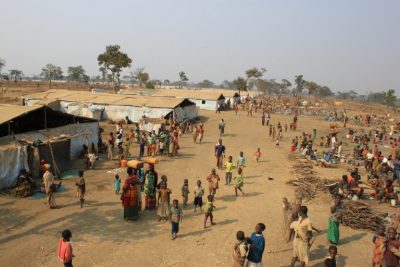By Faith Mario Mjalilla
This year’s World Health Day comes at a time when the COVID-19 pandemic is sweeping the globe and putting millions of lives at risk. It’s important to highlight that refugees are more vulnerable to infection due to their precarious living conditions in camps. As the world continues its attempt to flatten the curve and find a cure for the virus, it’s crucial to consider and include the particular vulnerabilities of marginalized populations to ensure an inclusive and effective global response.
Faith Mario Mjalilla, Program Officer Legal Advocacy and Communications at DIGNITY Kwanza, provides insights into the response in Tanzania and the implications of the COVID-19 pandemic for refugees:
As the Arabian proverb goes, “He who has health has hope, and he who has hope has everything.” For refugees and asylum seekers who have been forced to leave everything behind in their countries to find safety in a foreign land, health is their greatest wealth.
Recently the World Health Organization (WHO) declared the novel coronavirus (COVID-19) outbreak a pandemic. On 16th March, the government of Tanzania confirmed its first case. COVID-19 is a global challenge due to the absence of a vaccine and treatment. While COVID-19 does not discriminate and we are all susceptible, the precarious living conditions of refugees increases their vulnerability to the disease.
Likewise, the response to the virus should not discriminate; it should include those who are most marginalized like refugees. This is important because the best way to manage COVID-19 is by breaking the chains of transmission, which cannot be achieved if some individuals are excluded.
The Regional Administration and Local Government of Kigoma developed a COVID-19 Contingency Plan (KCP) which integrates refugees and asylum seekers as well. 244,629 of 287,160 registered refugees in Tanzania live in refugee camps that are located in Kigoma, a region bordering DRC and Burundi. Kigoma ranks second priority risk region; luckily, there are no officially confirmed cases of COVID-19 as of now. The government of Tanzania, UNHCR, and civil society organizations (CSOs) are working hard to ensure that refugees in camps are safe from COVID-19 by further scaling up health, water, sanitation, and hygiene (WASH). Currently, refugees in camps are being provided with extra soap and additional litres of water to 20 litres per person to reinforce personal hygiene practices. Hand-washing facilities have been established in public places and offices to slow the spread of COVID-19.
In urban settings, only a portion of the legally recognized refugees and asylum seekers with permits to reside in urban areas have been provided with sanitizers and soaps. The majority of urban refugees depend on UNHCR for their humanitarian needs, because they are not allowed to work, purchasing sanitizers, soap and enough water is a luxury they cannot afford with the little financial support they get from UNHCR. The situation is harder for refugees without permits who reside in urban areas. They do not receive any humanitarian assistance, and most have no jobs. They can barely get three meals per day, which may likely compromise their immunity.
They do not have access to enough water and cannot afford sanitizers or extra soap. How they will stay safe from COVID-19 is a mystery.
UNHCR, CSOs, and the government in refugee camps have been raising awareness to their staff, refugees, and host communities regarding COVID-19. They use posters prepared in different languages, seminars, and loud speakers to ensure that the message on COVID-19, preventive measures, and best health practices reach everyone.
The same is not done for urban refugees. It may be assumed that they have the same access to media as most Tanzanians in urban areas, but most of them are struggling to get their daily meal; they cannot think of buying a TV, radio, or newspaper. They are then at the risk of being misinformed hence risking everyone.
WHO and health care workers insist on social distancing. Refugee camps in Tanzania are already congested, making it easy for COVID-19 to spread rapidly. Like everywhere in the country, the government, UNHCR, and CSOs have been promoting social distancing in camps, and all schools are closed. These measures have brought many aspects of life to a standstill, but a strict response is necessary to stay healthy and to protect everyone. As refugees practice social distancing, the exercise to repatriate Burundian refugees is still in progress! While many countries have closed borders and suspended all the unnecessary movements to contain the virus, Burundi and Tanzania have not. Repatriation puts repatriating refugees and everyone else in danger.
The government and UNHCR have undertaken measures to improve the conditions of hospitals and creating isolation centres at refugee camps and villages of host communities.
The approach being taken to control the spread of the disease further demonstrates that it is necessary not only to see good health as the absence of illness. It is a fundamental part of daily life in which people attain their needs and cope with their environment to achieve physical, mental, and social well-being.
Faith Mario Mjalilla is a Research Assistant and Program Officer at DIGNITY Kwanza who particularly focuses on legal aid, policy advocacy and communications.
